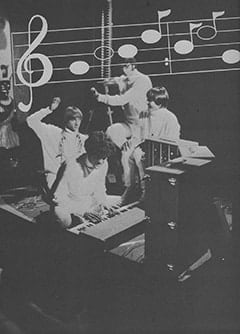
Here, at last, is the real truth about how Davy, Peter, Mike, and Micky create the songs that turn everyone on!
Now that the Monkees have established themselves as major songwriters I thought it might be interesting to find out what creative processes are involved in songwriting. In other words, what happens inside their heads as they write their songs? What are their sources of inspiration? Do they have any special techniques or methods for songwriting? The answers to these questions proved to be more than interesting. They became an education in themselves.
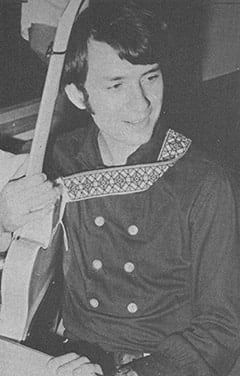
When I asked Mike these same questions he took a deep breath, looked down at the floor, and said, “You might as well have asked me to tell you my life story in three words or less, but I’ll give it a try. Sources of inspiration… well… I try to avoid limiting myself. I like the old standard subjects, boy meets girl, love, etc., but I want to write about them in a different way. I can become inspired by anything, not just sunsets, oceans, rainbows, you know, the things that turn everybody on. I like to write about what turns me on. I even wrote a song about my coffee table and the objects that sit on it—a wooden soldier, an ash tray, and one of Christian’s toys.”
“What about special techniques or methods”, I asked. “Do you have any sort of formula for aspiring songwriters?” “Of course not! You can’t write songs by any formula or gimmick. Songwriting isn’t a hobby; it’s an art. We can’t create music, we can only comment on it. A song is an opinion, an attitude toward or about music. Music itself is too big a thing for anyone to create. It’s just there.”
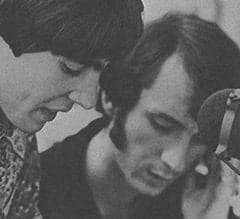
“How do you work? Do you write a certain number of songs each week or month?”
“No, I work in spurts. Sometimes I go for months without really writing anything. During one of these lulls writing becomes a chore rather than something enjoyable. But, finally the dry spell breaks and during the next few months I sort of slip into a groove and the songs begin to pour out. Everything seems easy for awhile, but then I fall back into a slump.”
“What advice would you give to hopeful young songwriters?”
“One of the major faults of novice songwriters is that they never complete a song. They only write parts of songs, but they never write a complete, finished product. And they usually lack confidence in themselves as songwriters. You have to think and believe that you are or can be a real songwriter. If you don’t believe in your own talents no one else will.”
Davy talks Permalink
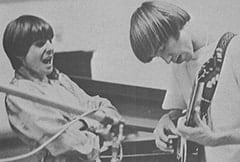
Davy has a different approach to songwriting. He likes a “big Broadway sound” and his songs reflect his interest in a “big sound.”
I asked Davy what effects he wanted to achieve in his songs and he said, “I like to make a trip out of writing a song. If I can’t get lost in a song I know it’s not good. A song should be a dramatic experience, not necessarily a story. The lyrics don’t have to be logical or fit a rhyme scheme, but they should be dramatic.”
“How do you write?” I asked. “Do you use a guitar or a piano?”
“I usually use a guitar. When I’m in my dressing room and a melody pops into my head I grab my guitar and arrange the chords. Then I write the words, but I usually end up changing the lyrics before I record the song.”
“Do you write by yourself or with other writers?”
“It depends on where I am when I write the song. If I’m writing in my dressing room and somebody comes up with a good idea I’ll use it. But if I’m by myself, well, I’ll do it alone.”
“Do you have any advice for hopeful young songwriters?”
Don’t give up Permalink
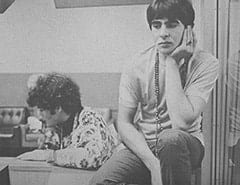
“Don’t give up if you think you have something to say. Too many talented people are discouraged because they don’t become immediately successful. Writing is a creative art and a songwriter is an artist, and an artist must be prepared to take success and failure in the same breath.”
“How do you judge your own songs? What standards do you set for yourself.”
“My neighbor has a huge dog named “Chunky” and I sometimes take the dog upstairs and sing to him. If he howls for ten minutes afterwards I know I’ve got something!”
Peter’s advice Permalink
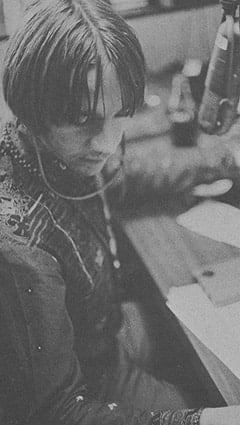
Peter has still another approach to this subject of songwriting. With his folk background he prefers “clean” songs, songs without a lot of instrumentation. He told me that “a song should be tight and clean, uncluttered by a lot of noise.” I didn’t really understand his statement so I asked him to explain. He said, “When I hear too many horns and violins I wonder what they’re trying to hide.”
“Do you have any advice for hopeful young musicians?”
“Do it, man, just do it. Jump right into the deep end and write. Don’t judge yourself by other people’s standards. If you like your songs, then you’re writing good songs. Be your own critic.”
Micky’s approach Permalink
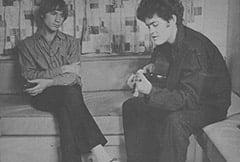
And Micky, of course, had another approach to the business of songwriting. “I like to improvise with other musicians, then when we’re making good sounds I hum different melodies until I hit on something that excites me. I like to work in short, concentrated bursts. I hate to drag things out. I write everywhere—on walls, napkins, tablecloths. I even wrote a song in the sand, at the beach. I mean I actually wrote the words in the sand. No paper, or walls, or tablecloths were around so I scratched the words into the sand with a piece of driftwood. However, the wind picked up and my song was lost. Alas! For Shame! etc.”
“What about your studio at home? Don’t you record there?”
“Well, sure. But I can’t be there all the time, can I? I don’t care where I am or what I’m doing, I’ll stop everything and start writing if a good idea for a song pops into my head.”
“What’s your favorite kind of music?”
“Driving, upbeat stuff. I like for music to pound me. It’s got to have drive and force. I don’t mean that every song should be fast and loud, but every song should have drive and energy. That’s the thing that turns me on to music—its energy and force.”
What’s the difference? Permalink
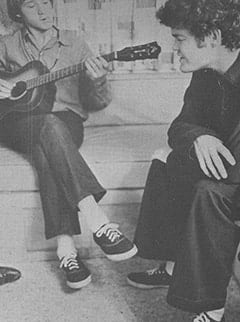
All four of the boys have drastically different approaches to songwriting, and I wondered how they were able to work together without constantly being at each others’ throats. I asked Micky how they avoided arguments among themselves at recording sessions and he said, “We don’t! We each fight tooth and nail for our own ideas, but we respect each other as musicians and songwriters. If we all had exactly the same ideas we might fall into a musical rut. This way our albums have variety.”
Talking to the Monkees about their music has opened new doors for me as a listener and as a writer. Put on a Monkee album, remember what Micky, Davy, Peter and Mike have said about their music and maybe some new doors will open for you too! At any rate, you’ll enjoy yourself.



